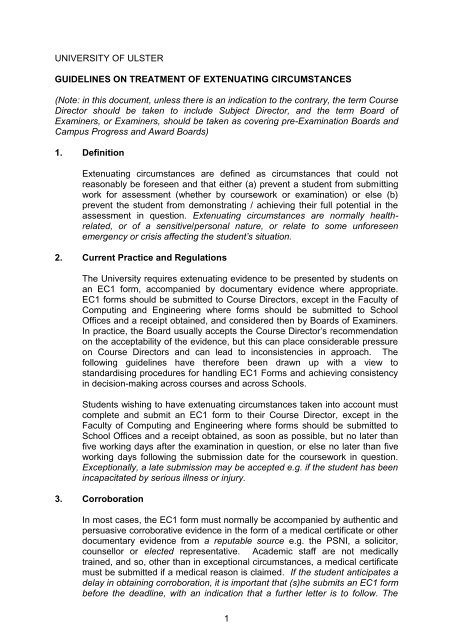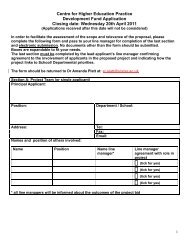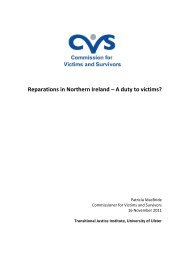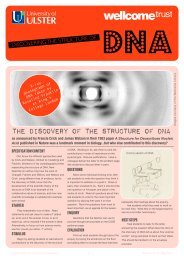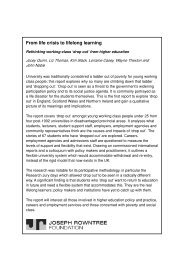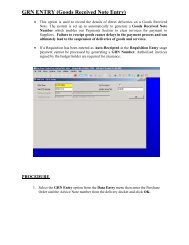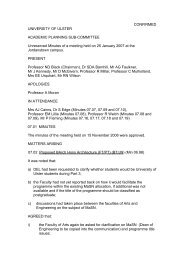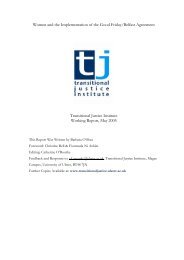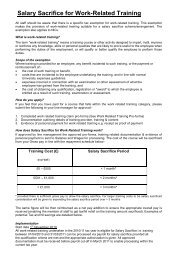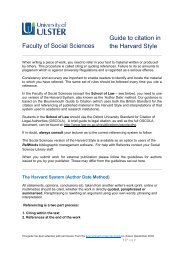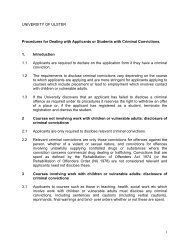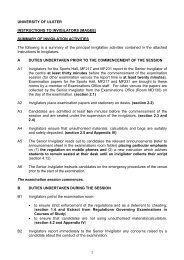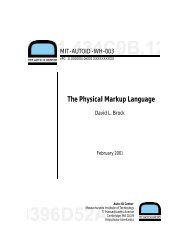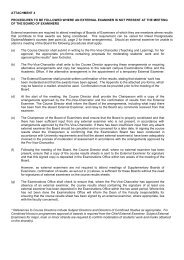Guidelines on Treatment of Extenuating Circumstances
Guidelines on Treatment of Extenuating Circumstances
Guidelines on Treatment of Extenuating Circumstances
Create successful ePaper yourself
Turn your PDF publications into a flip-book with our unique Google optimized e-Paper software.
UNIVERSITY OF ULSTER<br />
GUIDELINES ON TREATMENT OF EXTENUATING CIRCUMSTANCES<br />
(Note: in this document, unless there is an indicati<strong>on</strong> to the c<strong>on</strong>trary, the term Course<br />
Director should be taken to include Subject Director, and the term Board <strong>of</strong><br />
Examiners, or Examiners, should be taken as covering pre-Examinati<strong>on</strong> Boards and<br />
Campus Progress and Award Boards)<br />
1. Definiti<strong>on</strong><br />
<strong>Extenuating</strong> circumstances are defined as circumstances that could not<br />
reas<strong>on</strong>ably be foreseen and that either (a) prevent a student from submitting<br />
work for assessment (whether by coursework or examinati<strong>on</strong>) or else (b)<br />
prevent the student from dem<strong>on</strong>strating / achieving their full potential in the<br />
assessment in questi<strong>on</strong>. <strong>Extenuating</strong> circumstances are normally healthrelated,<br />
or <strong>of</strong> a sensitive/pers<strong>on</strong>al nature, or relate to some unforeseen<br />
emergency or crisis affecting the student’s situati<strong>on</strong>.<br />
2. Current Practice and Regulati<strong>on</strong>s<br />
The University requires extenuating evidence to be presented by students <strong>on</strong><br />
an EC1 form, accompanied by documentary evidence where appropriate.<br />
EC1 forms should be submitted to Course Directors, except in the Faculty <strong>of</strong><br />
Computing and Engineering where forms should be submitted to School<br />
Offices and a receipt obtained, and c<strong>on</strong>sidered then by Boards <strong>of</strong> Examiners.<br />
In practice, the Board usually accepts the Course Director‟s recommendati<strong>on</strong><br />
<strong>on</strong> the acceptability <strong>of</strong> the evidence, but this can place c<strong>on</strong>siderable pressure<br />
<strong>on</strong> Course Directors and can lead to inc<strong>on</strong>sistencies in approach. The<br />
following guidelines have therefore been drawn up with a view to<br />
standardising procedures for handling EC1 Forms and achieving c<strong>on</strong>sistency<br />
in decisi<strong>on</strong>-making across courses and across Schools.<br />
Students wishing to have extenuating circumstances taken into account must<br />
complete and submit an EC1 form to their Course Director, except in the<br />
Faculty <strong>of</strong> Computing and Engineering where forms should be submitted to<br />
School Offices and a receipt obtained, as so<strong>on</strong> as possible, but no later than<br />
five working days after the examinati<strong>on</strong> in questi<strong>on</strong>, or else no later than five<br />
working days following the submissi<strong>on</strong> date for the coursework in questi<strong>on</strong>.<br />
Excepti<strong>on</strong>ally, a late submissi<strong>on</strong> may be accepted e.g. if the student has been<br />
incapacitated by serious illness or injury.<br />
3. Corroborati<strong>on</strong><br />
In most cases, the EC1 form must normally be accompanied by authentic and<br />
persuasive corroborative evidence in the form <strong>of</strong> a medical certificate or other<br />
documentary evidence from a reputable source e.g. the PSNI, a solicitor,<br />
counsellor or elected representative. Academic staff are not medically<br />
trained, and so, other than in excepti<strong>on</strong>al circumstances, a medical certificate<br />
must be submitted if a medical reas<strong>on</strong> is claimed. If the student anticipates a<br />
delay in obtaining corroborati<strong>on</strong>, it is important that (s)he submits an EC1 form<br />
before the deadline, with an indicati<strong>on</strong> that a further letter is to follow. The<br />
1
nurses in the University Health Centre may be able to c<strong>on</strong>firm a student’s<br />
symptoms, if a GP appointment cannot be arranged so<strong>on</strong> enough.<br />
4. Impact <strong>of</strong> <strong>Extenuating</strong> <strong>Circumstances</strong><br />
It is important to recognise that all students have to cope with the ups and<br />
downs <strong>of</strong> everyday life – e.g. domestic disputes, m<strong>on</strong>ey pressures,<br />
relati<strong>on</strong>ship difficulties, the work-life balance – and so the routine distracti<strong>on</strong>s,<br />
obstacles and frustrati<strong>on</strong>s encountered in the normal course <strong>of</strong> events will not<br />
normally be accepted as valid extenuating circumstances.<br />
The EC1 form requires students to comment <strong>on</strong> the impact <strong>of</strong> their<br />
extenuating circumstances. It is not enough simply to dem<strong>on</strong>strate that the<br />
student suffered illness, anxiety or inc<strong>on</strong>venience in the run-up to the<br />
assessment in questi<strong>on</strong>. For example, a migraine suffered <strong>on</strong> the day <strong>of</strong> an<br />
examinati<strong>on</strong> will probably have a more detrimental impact <strong>on</strong> ultimate<br />
performance than a week spent in bed with „flu‟ at the start <strong>of</strong> the semester.<br />
Both the medical certificate and the EC1 form will have to establish a clear<br />
and timely c<strong>on</strong>necti<strong>on</strong> between the extenuating circumstances and the<br />
alleged impaired performance. The EC1 should also specify precisely which<br />
modules or elements <strong>of</strong> modules were affected.<br />
5. Anxiety and Stress / Student Support Services<br />
A certain degree <strong>of</strong> stress, anxiety and pre-examinati<strong>on</strong> nerves, and<br />
associated psychosomatic symptoms, are very comm<strong>on</strong> in the run-up to<br />
examinati<strong>on</strong>s. Coping with this pressure is part and parcel <strong>of</strong> the student<br />
experience. Presented with evidence <strong>of</strong> pre-examinati<strong>on</strong> stress, a Board <strong>of</strong><br />
Examiners will be entitled to take into account:<br />
the extent to which this stress prevented the student from performing to<br />
his/her full potential (and NB some students perform better when under<br />
pressure);<br />
the extent to which this stress is <strong>of</strong> a different nature to that<br />
experienced by all students at examinati<strong>on</strong> time;<br />
the extent to which this stress was self-inflicted, i.e. a c<strong>on</strong>sequence <strong>of</strong><br />
the student‟s failure to work steadily throughout the year;<br />
the extent to which this stress is likely to recur.<br />
Students who experience pre-examinati<strong>on</strong> stress, or who have a disability that<br />
might impair their performance, are encouraged to c<strong>on</strong>sult Student Support<br />
Services. The counselling service <strong>of</strong>fers c<strong>on</strong>fidential pr<strong>of</strong>essi<strong>on</strong>al advice<br />
which can be accessed <strong>on</strong> each campus. This service is flexible and students<br />
can be seen individually, or if preferred, workshops can be organised <strong>on</strong><br />
topics such as Exam Preparati<strong>on</strong> or Stress Management. Students can also<br />
attend the weekly Drop-in sessi<strong>on</strong>s, without an appointment, or arrange a<br />
l<strong>on</strong>ger appointment (see www.studentsupport.ulster.ac.uk).<br />
6. Disclosure <strong>of</strong> all Relevant Informati<strong>on</strong><br />
It is vital that students do not withhold evidence. EC1 forms are normally<br />
discussed at a pre-examinati<strong>on</strong> board meeting, in advance <strong>of</strong> the formal<br />
Board <strong>of</strong> Examiners. Meetings are c<strong>on</strong>ducted under c<strong>on</strong>diti<strong>on</strong>s <strong>of</strong> absolute<br />
c<strong>on</strong>fidentiality, and members have wide experience <strong>of</strong> the full range <strong>of</strong><br />
2
problems that students can encounter. The minutes <strong>of</strong> the Board <strong>of</strong><br />
Examiners will <strong>on</strong>ly record whether or not extenuating circumstances were<br />
c<strong>on</strong>sidered and accepted/rejected – the nature <strong>of</strong> the circumstances will not<br />
be minuted.<br />
While there may be some factors which the student prefers not to commit to<br />
paper, (s)he should reveal these by means <strong>of</strong> a private meeting with his/her<br />
Adviser <strong>of</strong> Studies or Course Director. If satisfied, the Adviser <strong>of</strong> Studies or<br />
Course Director may then report (without full disclosure) that in their<br />
pr<strong>of</strong>essi<strong>on</strong>al opini<strong>on</strong> the student has legitimate extenuating circumstances.<br />
However, the <strong>on</strong>us is always <strong>on</strong> the student to specify the degree <strong>of</strong> detail that<br />
(s)he wishes to have disclosed, and this will need to be sufficient to satisfy the<br />
Board <strong>of</strong> Examiners.<br />
7. Examples <strong>of</strong> <strong>Extenuating</strong> <strong>Circumstances</strong><br />
The term extenuating circumstances will have a restrictive interpretati<strong>on</strong>.<br />
While an element <strong>of</strong> discreti<strong>on</strong> will always have to remain with Boards <strong>of</strong><br />
Examiners, some examples should serve to differentiate between valid and<br />
n<strong>on</strong>-valid extenuating circumstances:<br />
Examples <strong>of</strong> extenuating circumstances that may be accepted by an Exam<br />
Board:<br />
(a) Illness in the run-up to an examinati<strong>on</strong> or coursework deadline, or<br />
during an examinati<strong>on</strong><br />
(b) Bereavement in the run-up to an examinati<strong>on</strong> or coursework deadline<br />
(normally a close relative i.e. parent, child, partner or sibling)<br />
(c) Sudden illness or emergency in c<strong>on</strong>necti<strong>on</strong> with a family member or<br />
dependent<br />
(d) Civil disturbance (rioting, intimidati<strong>on</strong>, bomb-scares, bus and rail<br />
disrupti<strong>on</strong>)<br />
(e) Traumatic event (e.g. being assaulted, or witnessing an accident or<br />
assault)<br />
(f) Extreme weather c<strong>on</strong>diti<strong>on</strong>s preventing either study or travel<br />
(g) Domestic upheaval (fire, burglary, evicti<strong>on</strong>)<br />
Examples <strong>of</strong> extenuating circumstances that would not normally be accepted:<br />
(h) Employment commitments limiting time available for study (although<br />
greater flexibility may be applicable to part-time students in full-time<br />
employment)<br />
(i) Pressure <strong>of</strong> other academic work e.g. other coursework due around the<br />
same time<br />
(j) Having to take a pre-arranged holiday<br />
(k) Wedding preparati<strong>on</strong>s<br />
(l) Sporting commitments (although excepti<strong>on</strong>s might sometimes be<br />
made, e.g. if the student were representing his/her country, or the<br />
University)<br />
(m) Missing a bus<br />
(n) Moving house<br />
(o) Failure <strong>of</strong> IT systems, or inability to gain access to IT systems, when<br />
the student has not taken adequate precauti<strong>on</strong>ary measures – e.g.<br />
failure to keep copies or save back-up versi<strong>on</strong>s, or ill-judged reliance<br />
3
<strong>on</strong> friends‟ or classmates‟ equipment or help, or leaving it to the last<br />
minute to seek access to University facilities. In all such cases, these<br />
difficulties could have been foreseen and avoided at an earlier stage.<br />
NB These examples are not definitive, and are intended <strong>on</strong>ly as a guide. In<br />
all cases, the Board <strong>of</strong> Examiners has ultimate authority to use its discreti<strong>on</strong>,<br />
taking into account the full circumstances <strong>of</strong> a particular case.<br />
8. Student’s Desired Outcome<br />
In their EC1 submissi<strong>on</strong>s, students should always make clear what outcome<br />
they are hoping for, in the knowledge that marks will never be awarded to<br />
compensate for extenuating circumstances. The most comm<strong>on</strong> outcome,<br />
when the Examiners accept an EC1 form, is that the student is allowed<br />
another attempt at the assessment, with no penalty (a “first sit”). Students<br />
should be prepared to discuss the financial opti<strong>on</strong>s open to them (e.g. fees,<br />
loans, bursaries) with the Students‟ Uni<strong>on</strong>, or staff from Finance/Student<br />
Support, as a particular course <strong>of</strong> acti<strong>on</strong> may prove to be unrealistic without<br />
the necessary financial support. For example, if a student‟s performance<br />
suffered because <strong>of</strong> financial problems, and (s)he hopes to repeat the year<br />
without financial support, then the problems are likely to recur.<br />
9. Role <strong>of</strong> Course Directors and Advisers <strong>of</strong> Studies<br />
Course Directors and Studies Advisers should emphasise to students that<br />
they are precluded from predicting or guaranteeing that a student‟s<br />
extenuating circumstances will be accepted - this is solely at the discreti<strong>on</strong> <strong>of</strong><br />
the Board <strong>of</strong> Examiners, except in the single case <strong>of</strong> extensi<strong>on</strong>s to<br />
coursework submissi<strong>on</strong> deadlines (below). Staff are nevertheless<br />
encouraged to point out when the student appears to have a very weak case,<br />
or to have submitted insufficient corroborative evidence, but at all times the<br />
<strong>on</strong>us is <strong>on</strong> the student to present a sufficiently persuasive case, with<br />
reference to the principles set out in these guidelines.<br />
10. Extensi<strong>on</strong> to the Deadline for Coursework Submissi<strong>on</strong><br />
Boards <strong>of</strong> Examiners have delegated to Course Directors resp<strong>on</strong>sibility for<br />
granting extensi<strong>on</strong>s to the deadline for submitting coursework, but <strong>on</strong>ly in<br />
cases where a compelling case has clearly been made. If the Course Director<br />
has any reservati<strong>on</strong>s, e.g. if insufficient corroborati<strong>on</strong> is presented, then (s)he<br />
should warn the student that the EC1 form might not be accepted and the<br />
student should be advised to submit the coursework. Should the Board <strong>of</strong><br />
Examiners subsequently accept the student‟s extenuating circumstances as<br />
valid, then EITHER the coursework will not be marked OR, if it has been<br />
marked, that mark will not be divulged and the student will have another<br />
opportunity to undergo the assessment in questi<strong>on</strong>.<br />
11. Misuse <strong>of</strong> EC1 Forms as “Insurance Policy”<br />
When extenuating circumstances are submitted in advance <strong>of</strong> an assessment,<br />
this is tantamount to asking to defer the examinati<strong>on</strong> or coursework<br />
assessment, and the student should make this clear by specifying their<br />
desired outcome. Thereafter, if the student submits an EC1 form and fails to<br />
attempt an examinati<strong>on</strong> or submit coursework, there is an element <strong>of</strong> risk in<br />
4
that the student cannot guarantee that the examiners will accept the case<br />
presented. However, this same set <strong>of</strong> guidelines is available to both staff and<br />
students, and the guidelines indicate what cases will or will not be accepted.<br />
Attempting an examinati<strong>on</strong> or submitting coursework is normally seen as a<br />
clear indicati<strong>on</strong> <strong>on</strong> the student‟s part that (s)he is fit to undergo assessment. If<br />
the student is taken ill during the examinati<strong>on</strong>, or c<strong>on</strong>cludes afterwards that<br />
their decisi<strong>on</strong> to undergo assessment was mistaken in light <strong>of</strong> their<br />
circumstances, then (s)he should submit an EC1 form within five working<br />
days.<br />
This EC1 submissi<strong>on</strong> amounts to a request that the examinati<strong>on</strong> script or<br />
coursework should be discounted, and should not be marked. In such an<br />
event, the Course Director may instruct the appropriate module co-ordinator<br />
not to mark the work until after the Board <strong>of</strong> Examiners has ruled <strong>on</strong> its<br />
acceptability. If the work has been marked by the time the EC1 form is<br />
submitted, then the mark may be cancelled and the student given another<br />
opportunity to undergo the assessment in questi<strong>on</strong>.<br />
12. Withdrawal <strong>of</strong> <strong>Extenuating</strong> <strong>Circumstances</strong><br />
As explained above, a student will not normally be able to withdraw an EC1<br />
form after receiving a mark for the work in questi<strong>on</strong>. However, a student who<br />
submits an EC1 form in advance <strong>of</strong> an assessment, and who then changes<br />
his/her mind (e.g. because <strong>of</strong> a rapid improvement in their circumstances)<br />
may withdraw the EC1 form before it is too late, i.e. in the following<br />
circumstances:<br />
by submitting the coursework within the deadline, al<strong>on</strong>g with an<br />
accompanying statement that (s)he wishes to withdraw the EC1 form,<br />
and/or;<br />
by attempting the examinati<strong>on</strong> after submitting a statement to the effect<br />
that they wish to withdraw the EC1 form. This statement can <strong>on</strong>ly be<br />
submitted to the Course Director, Adviser <strong>of</strong> Studies or School <strong>of</strong>fice<br />
before the start <strong>of</strong> the examinati<strong>on</strong>, and must be witnessed and signed<br />
<strong>of</strong>f to this effect, with the precise time recorded.<br />
13. Records <strong>of</strong> Decisi<strong>on</strong>s – <str<strong>on</strong>g>Guidelines</str<strong>on</strong>g> for Staff<br />
Cases <strong>of</strong> extenuating circumstances should be discussed initially at the preboard<br />
meeting <strong>of</strong> examiners, and a c<strong>on</strong>fidential note kept <strong>of</strong> why any cases<br />
were not accepted. An annual report <strong>on</strong> EC1 submissi<strong>on</strong>s will be prepared for<br />
each Faculty Teaching & Learning Committee, but individual student names<br />
will not be recorded <strong>on</strong> any reports.<br />
A list <strong>of</strong> names <strong>of</strong> students whose extenuating circumstances were<br />
c<strong>on</strong>sidered should be attached as an appendix to the formal minutes <strong>of</strong> the<br />
Board <strong>of</strong> Examiners, indicating <strong>on</strong>ly whether they were accepted or not i.e. no<br />
indicati<strong>on</strong> <strong>of</strong> the nature <strong>of</strong> the circumstances should be recorded.<br />
Faculties/Schools will retain a file <strong>of</strong> EC1 forms in a secure and c<strong>on</strong>fidential<br />
locati<strong>on</strong>, but this file will be periodically reviewed and normally individual EC1<br />
forms will be shredded within <strong>on</strong>e year <strong>of</strong> the student‟s leaving the University<br />
(by graduating or otherwise).<br />
5
14. Communicati<strong>on</strong> <strong>of</strong> Decisi<strong>on</strong>s to Students<br />
The Examinati<strong>on</strong>s Office will communicate the formal decisi<strong>on</strong> <strong>of</strong> the Board <strong>of</strong><br />
Examiners, but Course Directors and the relevant module coordinators are<br />
encouraged separately to communicate these decisi<strong>on</strong>s to students in a<br />
timely manner.<br />
15. Leave <strong>of</strong> Absence / Notificati<strong>on</strong> <strong>of</strong> Absence (NA1 Forms)<br />
If a student‟s difficulties are insurmountable, and/or likely to take a<br />
c<strong>on</strong>siderable period before they are resolved, then (s)he should c<strong>on</strong>sider<br />
applying for Leave <strong>of</strong> Absence (LOA) until the situati<strong>on</strong> has been resolved.<br />
Students can apply for LOA by completing secti<strong>on</strong> B <strong>of</strong> a Student Record<br />
Amendment Form, available from School and Faculty Offices. LOA should<br />
normally <strong>on</strong>ly be invoked for an interrupti<strong>on</strong> <strong>of</strong> studies which will mean that the<br />
student will not be attending for the rest <strong>of</strong> the semester/year, and will not be<br />
undergoing assessment.<br />
LOA is normally granted for a maximum <strong>of</strong> <strong>on</strong>e year at a time, so that<br />
circumstances are reviewed, and for a cumulative maximum <strong>of</strong> two years. If<br />
the difficulties seem likely to extend bey<strong>on</strong>d this period, the student should<br />
c<strong>on</strong>sider withdrawing from the University and reapplying for entry when fit, or<br />
when circumstances allow. In such an event, appropriate exempti<strong>on</strong>s may be<br />
granted but students are urged to c<strong>on</strong>sult their Adviser <strong>of</strong> Studies about all<br />
such issues.<br />
Other shorter periods <strong>of</strong> absence, which are unlikely to affect overall<br />
academic progress, should be notified using the Notificati<strong>on</strong> <strong>of</strong> Absence<br />
system (NA1 forms).<br />
16. SA1 Appeals and Retrospective <strong>Extenuating</strong> <strong>Circumstances</strong><br />
Students can appeal Examinati<strong>on</strong> Board decisi<strong>on</strong>s <strong>on</strong>ly <strong>on</strong> grounds <strong>of</strong> alleged<br />
procedural irregularity, or else because they had extenuating circumstances<br />
which, for a very good reas<strong>on</strong>, were not made known to the Examinati<strong>on</strong><br />
Board at the time (SA1 appeals). An appeals panel cannot change marks, but<br />
it can make decisi<strong>on</strong>s affecting a student‟s progress status. In reaching its<br />
decisi<strong>on</strong>, the appeals panel will have to be satisfied that there was a<br />
compelling reas<strong>on</strong> why the new evidence could not have been communicated<br />
to the Examinati<strong>on</strong> Board within the deadline; otherwise the appeal will<br />
normally be rejected.<br />
Students cannot challenge academic judgment, and they cannot appeal <strong>on</strong><br />
the grounds <strong>of</strong> e.g. alleged bad teaching if they have not raised this issue<br />
beforehand. Appeals al<strong>on</strong>g the lines <strong>of</strong> “I didn’t realise the extent to which I<br />
had been affected until I received my marks” will normally be rejected. Full<br />
details <strong>of</strong> the SA1 appeals procedure are available at<br />
http://www.ulster.ac.uk/academicservices/student/appeals.html.<br />
CC 6 Oct 2006<br />
Revised 10.12.10<br />
6


